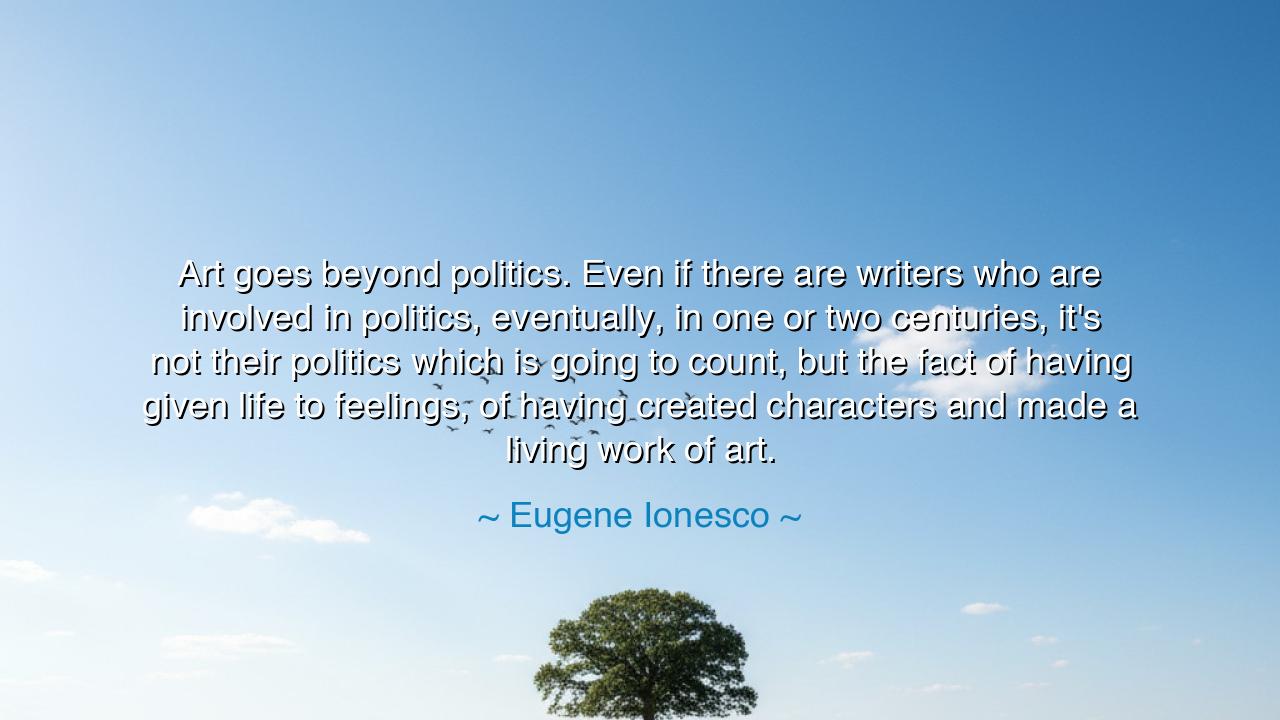
Art goes beyond politics. Even if there are writers who are
Art goes beyond politics. Even if there are writers who are involved in politics, eventually, in one or two centuries, it's not their politics which is going to count, but the fact of having given life to feelings, of having created characters and made a living work of art.






The words of Eugene Ionesco — “Art goes beyond politics… it’s not their politics which is going to count, but the fact of having given life to feelings, of having created characters and made a living work of art.” — proclaim the immortality of art above the fleeting struggles of politics. He speaks as one who knows that governments rise and fall, ideologies burn hot and fade, but the human heart remains, ever hungry for meaning, beauty, and truth. The artist who gives shape to feelings and breathes life into characters creates something that will outlast the empires of men.
The meaning is profound. While politics may command armies and laws, its victories are temporary, bound to the age in which they are forged. But art, once it takes root in the soul, transcends centuries. The politics of Shakespeare’s England is studied by the scholar, yet it is Hamlet’s grief and Lear’s madness that still move the world. Ionesco reminds us that what endures is not the party or policy of the writer, but the eternal resonance of the human spirit captured in words, music, or image.
History itself proves this. The poet Homer may have lived in a world of kings and city-states long forgotten, yet the Iliad and the Odyssey live on. We no longer remember the precise disputes of Achaean lords, but we know the wrath of Achilles, the longing of Odysseus, the tears of Penelope. Their feelings, carved into epic song, became timeless, while the politics of their day crumbled into dust. So too with Tolstoy, Dostoevsky, or Ionesco himself — remembered not for party loyalty, but for the living works of art they left behind.
The origin of Ionesco’s wisdom lies in his own life as a playwright of the absurd, where satire and surrealism cut through the illusions of ideology. He knew that laughter and sorrow carry truths that no manifesto can capture. By giving voice to the absurdity of existence, he created works that transcended his own century’s conflicts, carrying meaning to generations far beyond his time.
Therefore, O seekers of wisdom, mark this lesson well: art is the seed of eternity, politics but the weather of an age. Do not despise the political, for it shapes the lives of the living; yet know that it is the artist’s gift of feeling and character that speaks to the unborn. As Ionesco teaches, the work that endures is not the slogan but the song, not the policy but the poem, not the power but the passion. And thus, the artist becomes the true immortal, carrying the soul of humanity across the centuries.






HDLe Ho Hai Dang
This quote by Ionesco really resonates with me. He emphasizes how art, in its truest form, becomes timeless and transcends any political agenda. But does this mean that art should avoid political engagement altogether? Is it even possible for art to be completely apolitical, especially in times of social unrest? I find myself questioning whether the best art is the kind that defies political boundaries or the kind that actively challenges them.
QHHa Quang Huy
Ionesco’s quote makes me reflect on the lasting value of art beyond its political context. Politics may define a moment, but art has the power to evoke timeless emotions and ideas that transcend any single political agenda. Still, how much does the political environment influence the art of a particular time? And how does art shape political and social change in the present moment? Is it enough for art to be a reflection of the human condition, or should it directly engage with political issues?
MKTN Minh Khue
Ionesco’s comment about art transcending politics challenges the idea that art should always be used as a tool for political change. Instead, it focuses on the enduring nature of artistic expression, which can outlast political ideologies. But is it possible for art to remain entirely detached from politics, especially when political contexts shape so much of what artists create? I’m curious about how future generations will view the political art of today—will it still resonate, or will the political message be forgotten?
HTtran hoang toan
Eugene Ionesco's perspective on art and politics is thought-provoking. He suggests that, in the long run, it’s not the political views of writers or artists that matter, but their ability to create timeless works that capture universal emotions and characters. It makes me wonder—how much of a role do politics really play in art, especially when viewed through the lens of history? Will modern political art have the same lasting impact as more timeless works of creativity and human expression?